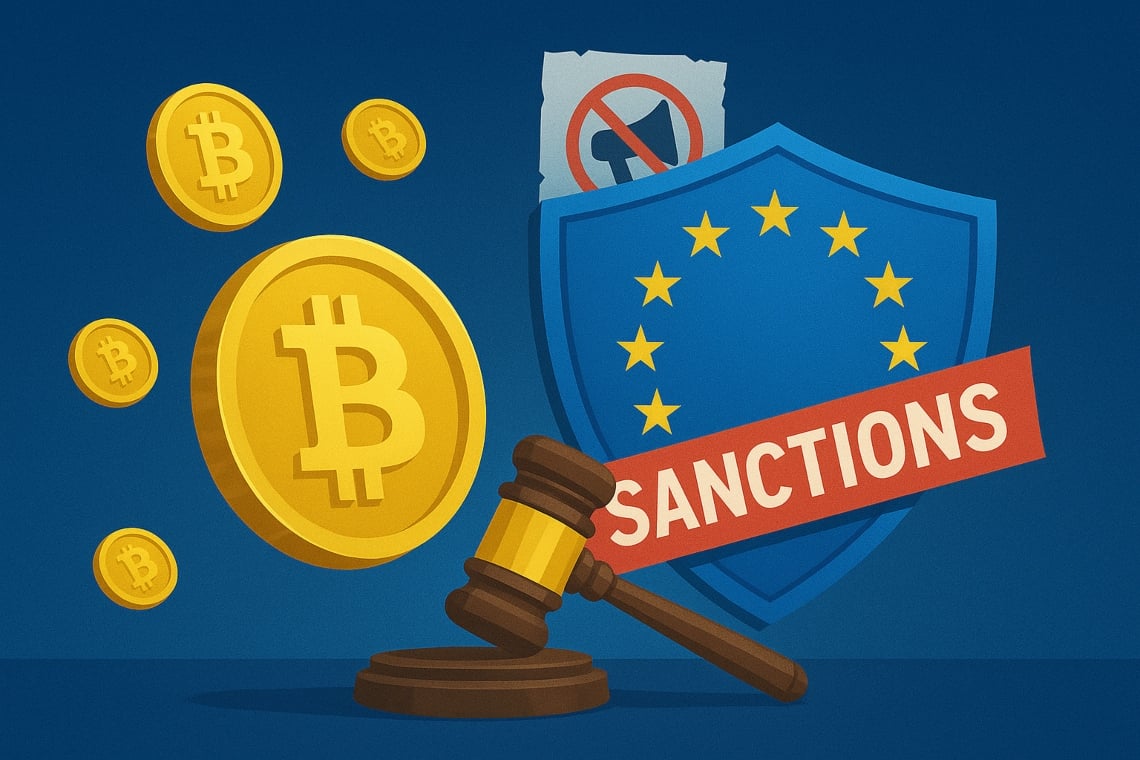Cryptocurrencies become the focus of the latest sanctions imposed by the European Union (EU) against activities of evading restrictions, illicit financing, and the spread of pro-Russian disinformation.
A strategic decision, made on Tuesday, introduces targeted actions that emphasize both individuals and the digital financial infrastructures associated with these phenomena.
EU sanctions on cryptocurrencies and their motivations
The European Union has adopted new sanctions on nine individuals and six entities involved in the use of cryptocurrencies to circumvent restrictions, channel funds, and intensify pro-Russian propaganda and electoral interference.
This package of measures represents a leap forward in European strategies, as it goes beyond blocking individuals or platforms: now the funding flows that fuel long-term influence operations are directly targeted.
The choice of the EU indicates a strategic shift: the fight against criminal electronic financing networks is a sign of firmness against systemic interference.
In a period of growing geopolitical tension, and just months away from the 2024 U.S. presidential elections and the European and Moldovan consultations, the decision fits into a framework of active prevention of electoral interference.
A key figure in this round of sanctions is Simeon Boikov, known as AussieCossack. According to reports, Boikov plays a central role in spreading pro‑Russian disinformation internationally.
A particularly significant episode concerns his responsibility in circulating a fabricated video about alleged electoral fraud in Georgia during the 2024 United States elections, aimed at sowing doubts about the legitimacy of the electoral process.
According to a report by TRM Labs, Boikov raised funds using various channels, including donations in cash and cryptocurrencies.
Aggravating factor: the main character allegedly used high-risk Russian exchanges, lacking KYC (Know Your Customer) checks, and received transfers from cash-to-crypto services and markets linked to the darknet.
This makes the monitoring and countering of digital tools used to finance propaganda and disinformation on a global scale even more urgent.
The role of companies: the case of A7 OOO and interference in Moldova
The new measures of the EU also target entities such as A7 OOO, a company involved in electoral manipulation practices in Moldova.
Founded by the Moldovan oligarch Ilan Shor, the company has distinguished itself for its ability to influence the Moldovan presidential elections of 2024 and the referendum on joining the European Union, through vote buying.
It is estimated that A7 OOO facilitated the transfer of one billion dollars from Moldovan banks, demonstrating the scope and sophistication of operations that exploit digital financial circuits for political destabilization activities.
In parallel, the United Kingdom has also imposed sanctions on A7 OOO for similar reasons.
The company is directly associated with a stablecoin pegged to the ruble, called A7A5, which emerges as the main vector of transactions on the Grinex platform, the exchange successor of Garantex, another Russian platform subject to international restrictions.
According to TRM Labs, the use of the stablecoin A7A5 is part of a strategy for expanding cross-border payments, developed after the Russian invasion of Ukraine.
The platforms Grinex and A7A5 are reportedly linked to the import operations of dual-use goods from China to Russia, through Central Asian routes.
These goods include materials and technologies that can be used in both civilian and military fields – with risks of use in weapon or surveillance systems – whose export is strictly regulated at an international level.
The sophisticated use of cryptocurrencies, even through alternative markets and unregulated platforms, represents a growing challenge.
Tools like stablecoin and exchanges lacking transparency facilitate not only concealed financial transfers but also the circumvention of restrictions on sensitive materials, complicating international monitoring of goods that could also fuel bull and bear programs.
An increasingly complex response to influence operations
The Unione Europea demonstrates the willingness to intervene on the front of digital financial flows, targeting not only individuals and companies involved, but also the tools and networks that allow the perpetuation of influence and disinformation campaigns.
Additionally, there is a growing cross-border coordination between the EU and its partners, such as the United Kingdom, to curb destabilization attempts through cryptocurrencies and innovative financial infrastructures.
- Increased attention to pro‑Russian funding flows
- Sanctions on key individuals of digital disinformazione
- Monitoring of digital assets used for the evasion of restrictions
- International coordination on high-risk crypto activities
The picture that emerges highlights how the European institutions have initiated a transition from targeting individual operators to more complex strategies aimed at blocking financial networks and technologies as a whole.
A rapidly changing landscape, where the architecture of sanctions becomes more dynamic and responsive to the rapid changes in digital financial technologies.
Ultimately, the recent EU sanctions contribute to significantly impacting the evasion strategies and the infrastructures that support disinformation and influence operations.
A decisive step that lays the foundations for a more structured and coordinated European response against emerging digital and financial threats, suggesting the need for constant innovation in the regulation and control of crypto flows on a global scale.
